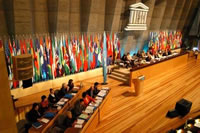Decision-making at UNESCO
UNESCO has three administrative bodies. The General Conference (AC), the Executive Council (IR) and the Secretariat. The Secretariat deals with the daily ins and outs of the organization. The Secretariat is headed by the Director-General (DG). The DG is elected for a term of four years and can be re-elected once for the same term. The DG is assisted by the Deputy DG, eight Assistant Directors General and their staff. The current DG, Mr. Ko & iuml; chiro Matsuura (Japan) was re-elected for a second term at the 33rd AC in 2005, up to and including 2009. The DG's tasks are to prepare the biennial work plan and the accompanying budget, to report periodically on the activities of the organization and the personnel policy.
The DG office coordinates the activities of the General Conference, the Executive Council, the 'Office of international standards and legal affairs'. and the & lsquo; Internal oversight office & rsquo ;. Several agencies deal with the administrative side of the organization, such as the & lsquo; Bureau of Human Resources Management & rsquo; and the & lsquo; Bureau of Public Information & rsquo ;. The & lsquo; Bureau of Strategic Planning & rsquo; formulates future policy. From this structure, the four sectors of UNESCO are managed.
The General Conference, UNESCO's highest body, takes place every two years, approving the work plan and accompanying budget for the next two years as well as the Mid-Term Strategy for the next six years. The 191 Member States each have one vote. Furthermore, the AC appoints the Director General and elects the 58 members of the Executive Council for a term of four years. Finally, the General Conference may decide to have the Executive Council establish committees to conduct certain investigations.
The 58 member states of the UR are elected via the constituency system that is customary within the United Nations. Member states are subdivided by region. The Executive Council is responsible for controlling the organization's programs and budget. The DG initiates plans, which the UC then has to approve. The UR has the following committees: & nbsp; the & lsquo; Program and External Relations Commission & rsquo; and the & lsquo; Finance and Administrative Commission & rsquo ;. The work is divided between these two committees according to the subject. In principle, consensus is sought when taking decisions. If this proves impossible, proposals are put to the vote in plenary.

